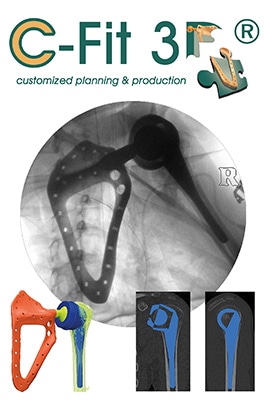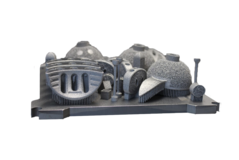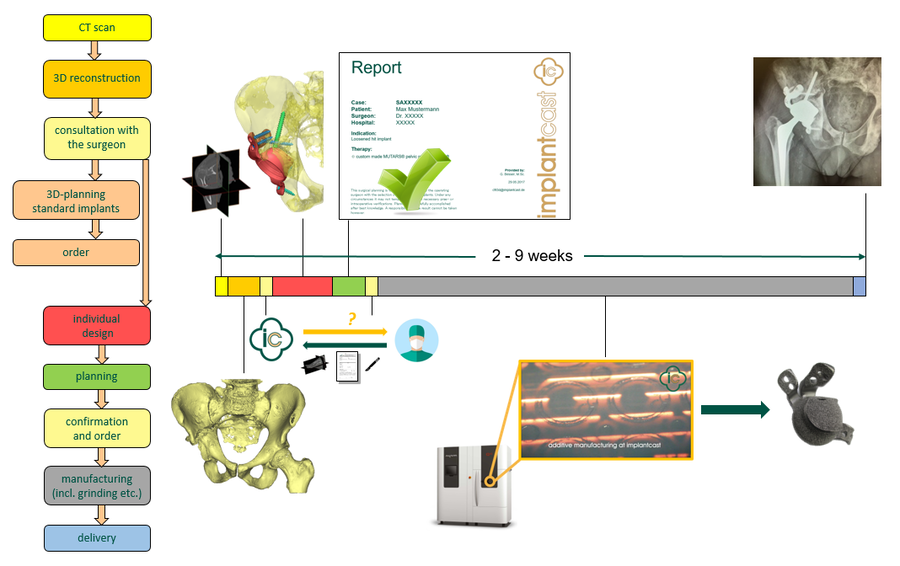
Individuality
- in Motion.

Our ability –
your advantage!
→ More than 30 years of experience with individual implants
→ More than 20 years of experience in the field of partial pelvic replacement
→ direct coordination between surgeon, designer and manufacturing
→ from glenoid to calcaneus - we plan, design, manufacture implants for various areas of the body
→ broad spectrum of modular standard implants, which can be combined and complemented with individual implants
→ every custom made implant is subject to the same, high quality requirements as CE certified standard implants
Requests & contact
Would you like to submit a request for an individual implant?
Please register here https://icaps.implantcast.com or click here Image Upload.
An employee will get in touch with you within 24 hours.
Alternatively you can submit the filled out request form for custom-made devices together with the CT/MRI data and scaled x-rays to cfit3d@implantcast.de via email.
Do you have any questions?
Please contact one of our experienced engineers of the C-Fit 3D®-Teams via email to cfit3d@implantcast.de
C-Fit 3D®
The Modular Tumor and Revision System MUTARS® offers the possibility to provide standardized implants for most cases due to its modularity.
Complicated bone defects after revisions, large tumor resections - or anatomical particularities often require the use of an individually adapted endoprosthesis.
implantcast offers the service of digital, preoperative prosthetic planning. In this way, problematic cases can be detected in time and an individual implant can be produced that meets the patient's needs.
Our service
- 2D/3D-Planning of individual implants
- 2D/3D-Planning of standard implants
- 3D-Planning of patient specific instruments (PSI)
The planning is carried out in close consultation and cooperation with the surgeon and includes the needs of the patient as well as the wishes and experiences of the surgeon.
A detailed planning report presents the preoperative situation, the characteristics of the custom-made prosthesis and the postoperative situation to be achieved. In addition, a special surgical technique is required, which describes the assembly and implantation of the prosthesis in detail. A 3D plastic model of the affected bone region is available on request.
Pre-operative Planning
The basis for custom-made implants and instruments
For accurate adaptation of the endoprosthesis or of the patient-specific instrument to the anatomical conditions of the patient, precise information about the initial situation of the patient is absolutely necessary.
These include:
- detailed information on type of treatment and the length of reconstruction or resection
- scaled X-ray images as film or digitized, A/P- and M/L-view of the entire operation area
- X-ray ruler on bone level (to avoid scaling errors)
- high-resolution CT data (layers <1mm) for complex reconstructions (for example, partial pelvic replacement)
- treatment request and general patient data
Using a special software, it is possible to create a 3D model of the bone / joint to be reconstructed from high resolution MRI or CT data. By segmenting the layer images in the transversal, sagittal and frontal planes, the relevant structures can be displayed three-dimensionally, separated from the rest of the tissue and exported as a 3D model. This 3D model is the basis for the constructive implementation of an individual prosthesis. This method enables the exact adaptation of the implant to the individual anatomical conditions of the patient. In addition, bone loss can be reduced by the precise planning and the risk of infection can be minimized by the resulting shorter duration of surgery.
Customized Manufacturing
Precise planning is the basic requirement for a perfectly fitting implant. Just as important is the accurate manufacturing, in order to implement the previous planning exactly. For this reason, in most cases, we use additive manufacturing (3D printing) as a means of choice.
The additive manufacturing enables the production of implants with EPORE® surface. On request individual implants with EPORE® surface and various coatings can be made.
The time for manufacturing an individual prosthesis is between 2 and 9 weeks, depending on the manufacturing scope.

Technology
The process of an individual implant / instrument in the overview

This area is intended for medical professionals only and may only be provided to certain professional personnel.